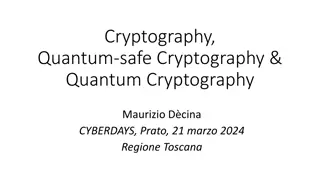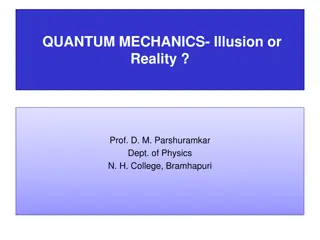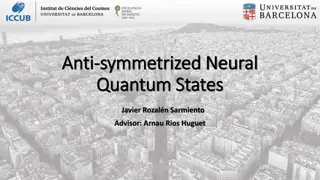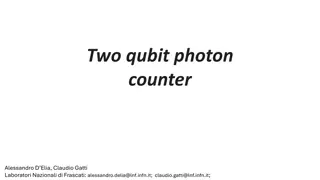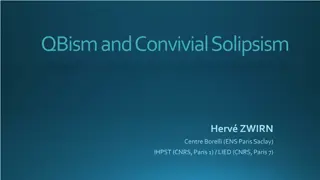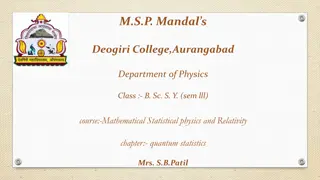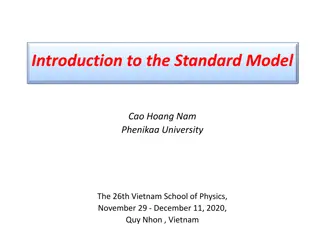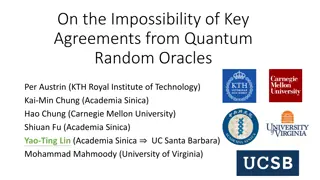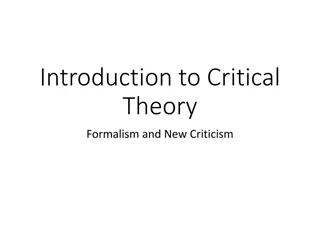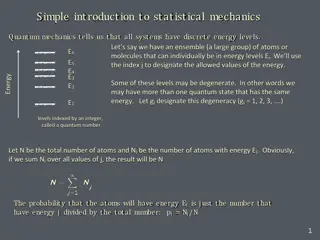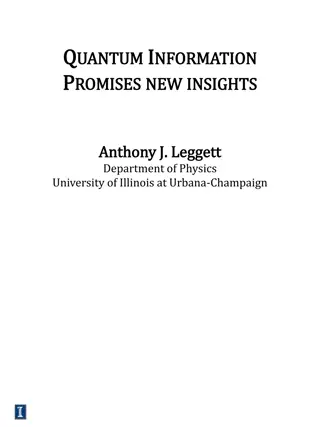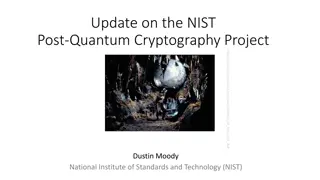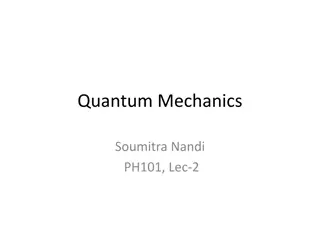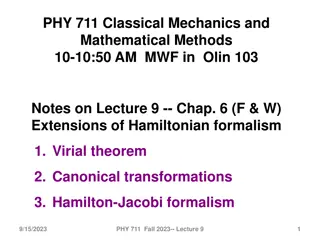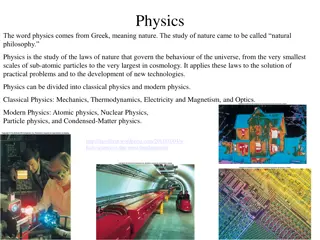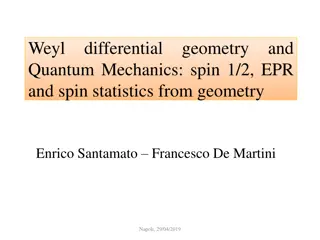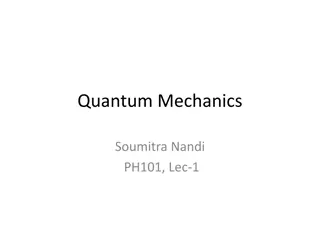Understanding Operator Formalism in Quantum Mechanics
Dive into the world of quantum mechanics with Dr. N. Shanmugam as he explains the role of operators, their significance in quantum mechanics, and how they are used to determine physical quantities through expectation values. Explore concepts such as the Hamiltonian operator, time-independent Schrodinger equation, and the plane wave solution. Gain insights into the fundamental principles that govern the behavior of particles at the quantum level.
Download Presentation

Please find below an Image/Link to download the presentation.
The content on the website is provided AS IS for your information and personal use only. It may not be sold, licensed, or shared on other websites without obtaining consent from the author. Download presentation by click this link. If you encounter any issues during the download, it is possible that the publisher has removed the file from their server.
E N D
Presentation Transcript
OPERATOR FORMALISM OF QUANTUM MECHANICS Dr. N. Shanmugam ASSISTANT PROFESSOR DEPARTMENT OF PHYSICS ANNAMALAI UNIVERSITY DEPUTED TO D. G. Govt. Arts college (W) Mayiladuthurai-609001 7/17/2024 1
WHAT IS AN OPERATOR? Operator is a mathematical quantity when it operates on one function, it charges the function into another one and some times leave the function unaffected. Examples of operators are addition, subtraction, multiplication, division, differentiation, integration, operations of grad, div, curl etc. 7/17/2024 2
WHY WE NEED AN OPERATOR? According to Heisenberg s uncertainty principle, some physical quantities like position, momentum, energy, time, etc cannot be measured beyond a certain degree of accuracy in quantum mechanics. Therefore, the physical variables are given in terms of the average value. To determine the average of physical quantities, some suitable operators are used. 7/17/2024 3
EXPECTATION VALUE Among the so many measurements made on a single dynamical variable, most of the time we can get a particular value called the expectation value. 7/17/2024 4
The expectation value of an operator A is 7/17/2024 5
Hamiltonianoperator From classical mechanics Hamiltonian H = T + V T = kinetic energy, V= potential energy We know that the value of momentum operator is 7/17/2024 6
Free particle Hamiltonian For a free particle V=0 7/17/2024 7
( (Time Independent Schrodinger Equation) E= Energy Eigenvalue (Time dependent Schrodinger Equation) 7/17/2024 8
Prove that The plane wave solution to the Schrodinger equation is 7/17/2024 9
or 7/17/2024 10
7/17/2024 11
7/17/2024 12
Eigenvalue equation is 13 7/17/2024 3:08:33 PM
7/17/2024 14
Identity (or) Unity operator Null operator 7/17/2024 15
Inverse operator (or) -1 = -1 = -1 and -1are inverse operators. Equal operator 7/17/2024 16
Parity operator The parity operator is a special mathematical operator and is denoted by . For a wave function of the variable x, The parity operator is defined as This means that when the wavefunction by the parity operator, it gets reflected in its co-ordinates. is operated 7/17/2024 17
, Eigenvalue of parity operator The Eigenvalue equation of the parity operator is Operating the above equation again by This means that is the parity operator is operated twice Hence, 7/17/2024 18
Therefore, the Eigenvalues are +1 and -1. From the equations 1 and 2 If =1, the wave function is even If = -1, the wave function is add Bosans are described by symmetric wave function. Fermions are described by symmetric wave function. 7/17/2024 19
Commuting operator Therefore AB BA = 0 [A, B] = 0 Anti commuting operator ie AB + BA =0 7/17/2024 20
Linearoperator An operator is said to be linear if it satisfies the relation where C1 and C2 are constants. The inverse operator A-1 is defined by the relation An operator commutes with its inverse 7/17/2024 21
Hermitianoperator Consider the Pauli s spin operator Conjugate transpose is called dagger. If Then is Hermitian 7/17/2024 22
An operator satisfy the following condition. is said to be Hermitian if =A and it should 7/17/2024 23
For any operator A (a) Hermitian, (b) anti Hermitian, (c) unitary, (d) orthogonal 7/17/2024 24
Eigen values of Hermitian operators are real Consider the Eigenvalue equation Pre multiply equation 1 by ?* and than integrate If A is Hermitian From equations 2 and 3 7/17/2024 25
Two Eigenfunctions of Hermitian operators, belonging to different Eigenvalues, are orthogonal Consider ?, and ? are the two Eigenfunctions of the Hermitian operator . There we can write Pre multiply equation 1 by ?* and then integrate, we can get If A is Hermitian 7/17/2024 26
3-4 From equation 5, it is clear that (a-b) 0 i.e a b, but should be equal to zero. This means that the wavefunctions ? and ? are mutually orthogonal. 7/17/2024 27
The product of two Hermitian operators is Hermitian if and only if they commute. Suppose ?1 and ?2 are two functions, using the operators A and B, we can develop an integral If A is Hermitian Again, if is Hermitian we can write If AB is Hermitian 7/17/2024 28
If the operators A and B commute, we have Which is the condition for the product operator to be Hermitian 7/17/2024 29
If A, B, and C are non-zero Hermitian operators, which of the following relation must false? a) [A, B] = C, b) AB + BA = C, c) ABA = C, d) A+B =C Solution Given + 7/17/2024
Prove that the momentum operator is Hermitian Momentum operator If P is said to be Hermitian The expectation value of can be written as We have to solve the above integral Put 7/17/2024 31
7/17/2024 32
Prove that parity operator commutes with the Hamiltonian = Parity operator H = Total Hamiltonian We have to prove [ , H] = 0 ie H= H H - H = 0 we know that 7/17/2024 33
7/17/2024 34
7/17/2024 35
Angular momentum operators We know that the orbital angular momentum 7/17/2024 36
7/17/2024 37
7/17/2024 38
7/17/2024 39
7/17/2024 40
lliy But 7/17/2024 41
Value of Commutation relation between L2 and Lz 7/17/2024 42
We know that [AB,C] = [A,C]B + A[B,C] In the same way we can prove that -----------1 7/17/2024 43
-------------2 From the equations 1 and 2 We may conclude that the square of the angular momentum operator commutes with one of its components but the components among themselves do not commute. 7/17/2024 44
Raising and Lowering operators (Ladder operators) are called raising . and lowering operators, repectively. Each time operation of the raising operator may increase the Eigenvalue of the system by one unit of On the other hand, each time operation of lowering operator may decrease the Eigenvalue of the system by one unit of . Therefore, these operators are called Ladder operators. 7/17/2024 45
Commutation relation between Similarly 7/17/2024 46
Commutation relation between 7/17/2024 47
In the same way we can prove that 7/17/2024 48
7/17/2024 49


